EU member states block new Russia sanctions
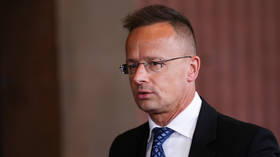
Hungary and Slovakia have blocked the European Union’s 18th sanctions package against Moscow, Hungarian Foreign Minister Peter Szijjarto has announced. The bloc's proposal to cut Russian energy imports would deal a major blow to his country’s energy security, he explained.
Budapest has opposed EU sanctions on Russian energy since the escalation of the Ukraine conflict in 2022, saying the imports are vital to its national interests. The country has a long-term contract with Russia's Gazprom and receives the bulk of its oil and gas from Russia. Slovakia has also voiced similar concerns.
Speaking at a press conference following a meeting of EU foreign ministers in Brussels on Monday, Szijjarto said that “we, together with Slovakia, prevented the adoption of the [18th] sanctions package today,” which would mostly have focused on Russia’s energy sector.
The diplomat clarified that Budapest and Bratislava vetoed the sanctions package because in separate trade legislation, Brussels has proposed phasing out all remaining Russian gas flows to the EU by the end of 2027. The minister argued that this would severely undermine Budapest’s energy security and lead to a sharp spike in energy costs for Hungarians.
”We are not willing to have the Hungarian people pay the price for supporting Ukraine,” Szijjarto insisted.
The EU-wide phasing-out plan that Szijjarto referred to was announced by EU Energy Commissioner Dan Jorgensen last Tuesday, with the backing of European Commission President Ursula von der Leyen.
The proposal, which is currently opposed by Hungary, Austria and Slovakia, and reportedly by Italy, is expected to be introduced as trade legislation, which under EU rules does not require unanimity among bloc members to become law, but merely the support of at least 15 of the EU’s 27 member states.
Commenting on the plan, Russian presidential envoy Kirill Dmitriev, said that “EU Commission bureaucrats seem obsessed – with making the EU as uncompetitive as possible on the global stage.”
While pipeline flows have dropped sharply since 2022, EU imports of Russian liquefied natural gas (LNG) have soared. Russia supplied 17.5% of the bloc’s LNG in 2024, trailing only the US at 45.3%, according to industry data. France, Spain, and Belgium accounted for 85% of the EU’s LNG imports from the sanctioned country, according to the Institute for Energy Economics and Financial Analysis (IEEFA).
Russia maintains that it is still a reliable energy supplier, while denouncing Western sanctions and trade restrictions targeting its exports as illegal under international law.
==============================================================================================
The War Industry betrays friendships
Moscow accuses Belgrade of betraying friendship
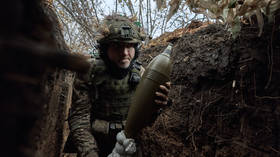
Ukraine’s military continues to receive weapons from Serbia, Russia’s Foreign Intelligence Service (SVR) has stated in a press release published on Monday, in which it accused Belgrade of betraying its historic friendship with Moscow.
Officially, Serbia has avoided backing Kiev in the conflict and asserted its neutrality.
Despite this, Serbian defense firms have been increasing their supply of ammunition to Ukraine, according to the SVR. The agency asserts that this has been made possible through indirect export schemes designed to obscure the weapons’ true destination.
The SVR said that Serbian-made munitions are being exported as kits to NATO countries, where they are assembled before being transferred to Ukraine. The components are reportedly shipped primarily to the Czech Republic and Bulgaria, allowing Kiev to formally receive fully built weapons from NATO soil rather than directly from Serbia.
According to the Russian intelligence agency, Serbian arms producers are fully aware that their products are ultimately destined for the Ukrainian military and that their munitions “will kill Russian servicemen and civilians.”
“It is regrettable that now these traditions of friendship and mutual assistance are being erased by the thirst for profit and cowardly multi-vectorism,” the SVR concluded.
Following the report, Serbian President Aleksandar Vucic announced on Monday that Belgrade has suspended the export of ammunition and that special permissions will now be required for such shipments.
”We have now stopped literally everything and are sending it to our army,” he said.
The accusation follows a similar claim made by the SVR in late May, in which it alleged that Serbian companies had secretly shipped 100,000 rockets and one million small arms rounds to Ukraine. The weapons were allegedly rerouted through various states, using falsified end-user certificates.
Vucic responded at the time by denying the existence of any direct contracts with Kiev, and emphasized that Serbian law prohibits the supply of weapons to countries at war. He insisted that any such arms that do reach Ukraine must have done so via third countries, and pledged to clamp down on attempts to circumvent export controls.
Moscow has consistently criticized foreign military aid to Ukraine, stating that it only prolongs the conflict and leads to more bloodshed without affecting the final outcome.
NATO - War Industry storefront; Mark Rutte - salesman-in-chief
NATO chief dodges question about why to
fear a ‘Russian attack’
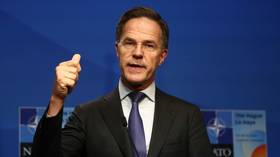
NATO Secretary General Mark Rutte has failed to explain why the bloc believes Russia could attack within five years despite citing the claim during a press conference on Monday to legitimise his calls for increased military spending.
In recent months, a number of Western officials have repeatedly claimed that Russia may attack an Eastern European member state in the near future, using the rhetoric as a foundation for drastically raising defense spending. Moscow has vehemently denied harboring any hostile intent, and called such accusations “nonsense.”
While speaking at a pre-summit press conference in The Hague, Rutte was asked to disclose what NATO’s assessment of a Russian attack within five years was based on. The secretary general, however, avoided giving any specific intelligence or threat assessment, citing only general fears and urging an increase in the bloc-wide defense spending target to 5% of GDP.
Rutte said there was “great worry in many circles of NATO” and referred to “senior military leaders” and “intelligence community people” who have spoken about the possibility that “3, 5, 7 years from now, Russia will be able to successfully attack us, if we do not start investing more today.”
Surely, there must be some intelligence that points to Russian ambitions in Europe. Where is it?
He emphasized that “huge extra defense spending over the next three to five years” was required to ensure NATO’s future readiness. According to Rutte, yearly increases would be needed to strengthen the bloc through new personnel and military equipment.
Russia has consistently rejected the idea that Moscow plans to invade NATO countries, with President Vladimir Putin calling the accusations “nonsense” and “shameless lies” designed to extract resources from the population and divert it towards military spending.
Speaking to military academy graduates on Monday, Putin stated that the West “came up with this horror story themselves and repeats it year after year,” using it to provoke a new arms race and justify what he called “global militarization.”
Kremlin spokesman Dmitry Peskov has also slammed NATO’s “unbridled militarization” and suggested that the bloc would need to create a “monster” to push through the proposed 5% GDP defense spending benchmark.
“Let’s call things by their proper names,” he said. “This is an alliance created for confrontation. This is an alliance that brings aggression and confrontation. This is not an instrument of peace and stability.”
======================================================================
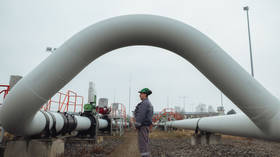
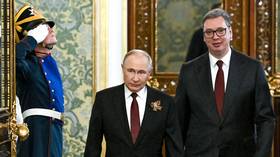


No comments:
Post a Comment